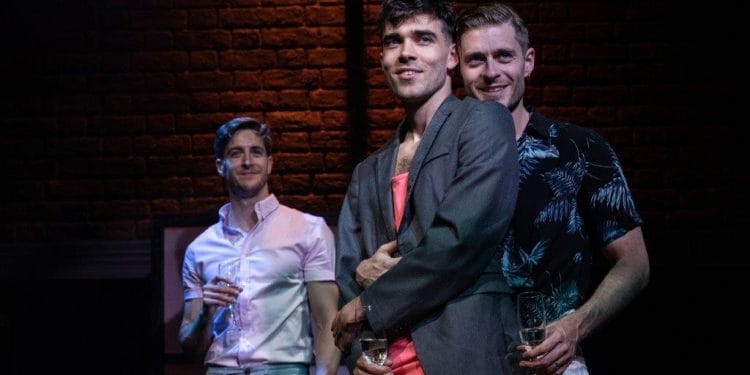 When Afterglow opened off-Broadway last year, it drew more comments about its unabashed and prolific nudity than its storyline or cast, but that didn’t stop it extending its run several times. Now in London, this time directed by Tom O’Brien rather than its author, the nudity is confined to the first few scenes, but its ubiquitousness sets the tone for a play where nothing is hidden.
When Afterglow opened off-Broadway last year, it drew more comments about its unabashed and prolific nudity than its storyline or cast, but that didn’t stop it extending its run several times. Now in London, this time directed by Tom O’Brien rather than its author, the nudity is confined to the first few scenes, but its ubiquitousness sets the tone for a play where nothing is hidden.
In this debut by S. Asher Gelman, married couple Alex and Josh enjoy an open relationship, meaning they are free to sleep with other men as long as they follow the rules they have set; it can’t be kept a secret and there can be no overnighters. Also actively is encouraged is the presence of a third man in their marital bed, which is where the younger Darius comes in to the mix.
This seemingly perfect arrangement turns sour, when Josh and Darius start to see each other alone. It’s all within the rules, but their romance develops further; the word ‘love’ is even mentioned, and for Alex it all becomes too much, he watches from the sidelines as his husband falls in love with another man.
New plays have tended to move away from the traditional coming out story, focussing instead on day to day domestic gay life. Polyamorous relationships are in no way exclusive to the gay community, but it seems it’s always been easier to portray gay men as promiscuous. Afterglow takes advantage of this stereotype and flaunts it to extremes.
Josh and Alex are so incredibly smug about their perfect lives; they have a trendy apartment and money to burn, and they have a baby on the way thanks to surrogacy, but they still enjoy lots of sex with other men. When their latest tryst starts to complicate their marriage, it’s difficult to feel empathy for them.
This is deliberate of course, because Afterglow is asking us to think very carefully about the situation, if we choose to take sides, then which side do we pick? None of the three characters are entirely innocent, but then none of them are particularly guilty either.
While Josh and Alex languish in selfishness, Darius is another matter, the masseuse who craves human touch as loneliness and disillusionment sweeps over him. He teases his older lover about his age (thirty-five!) all the while aspiring to similar life goals, but tells Josh he is “paralysed by the illusion of choice.”
Jesse Fox is wonderful as Darius, allowing us to really feel the pain and isolation of the character. His character is the third wheel in this ménage à trois, but you can find sympathy for him in the way he has been drawn in by the experienced couple. Danny Mahoney also brings out the torment that begins to creep over Alex, as he watches his husband’s love affair spiral out of control, while Sean Hart’s Josh hits the mark for childish and selfish actions.
The scenes are quick, snappy and usually bursting with some kind of energy. But the pacing becomes disappointingly flaccid at each scene change, which sees the cast having to take an extraordinary amount of time to shift furniture around the stage. Not even the techno dance music and nightclub lights can keep the energy sustained during these set moves.
Afterglow had a promising start, with a storyline that could provoke reflection and debate, but some of that was lost as the play progressed. Some audience members may feel there was too much focus on nudity, and enforcing stereotypes, over emotional depth. Where the script occasionally fails the cast pick up the slack, keeping the play ticking over, but as a production it never really reaches the climax we’re all waiting for.























